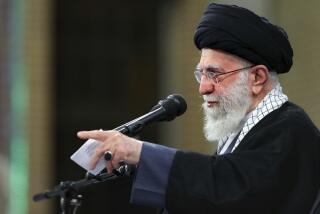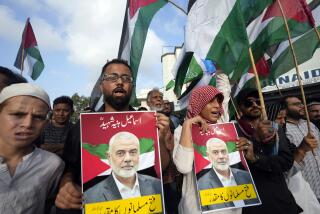Arab Anger Rising Over Israeli Clampdown
- Share via
AMMAN, Jordan — Across the Arab world, anger is replacing the initial sympathy for Israel following the recent wave of suicide bombings.
Israeli Prime Minister Shimon Peres’ crackdown in response to the bombings--closure of the West Bank, demolition of Palestinian houses, arrests of hundreds of people associated with political groups that sponsored the bombers--appears to be eroding the fragile goodwill that existed toward Israel and threatening the peace process.
As a follow-up meeting to the “Summit of the Peacemakers” gets underway today in Washington, Arab countries are demanding that the agenda be broadened to bring an early end to what they call the “collective punishment” of all Palestinians for the crimes of a few.
“What Israel is doing every day is humiliating the Arabs--both the Palestinians who are our neighbors and the whole Arab world,” said Jordanian writer Mounes Razazz. “They deal with people as if they have been defeated, and in this case they cannot make peace.”
Rising Arab outrage at the monthlong blockade of the West Bank and the Gaza Strip, which President Yasser Arafat’s Palestinian Authority says has thrown 60,000 people out of work and cost the impoverished territories $6 million a day in lost wages and trade, is behind a sharp diplomatic row over the two-day Washington conference. The meeting was called to come up with specific ways to fulfill the goals of the March 13 antiterrorism summit held in Sharm el Sheik, Egypt.
The Clinton administration wanted the conference to focus on coordinated steps to oppose international terrorism, including exchanging information about terrorist groups and cutting off the secret pipelines of money to them.
But Egypt--the co-sponsor of the Sharm el Sheik summit--is joined by the Palestinian Authority, most Arab states and France in trying to broaden the agenda. They say the current Israeli actions against Palestinians should also be addressed because they run counter to the original summit’s other main goal: reviving the Arab-Israeli peace process after the bombings.
“We cannot accept the Palestinian people being starved and their homes being demolished,” said Egyptian Foreign Minister Amir Moussa.
Israel, supported by the United States, argues that its tough moves have been needed to safeguard its territory and deter would-be terrorists after four suicide bombings between Feb. 25 and March 4 that killed 58 victims and four attackers.
Now beginning a tight election campaign against the right-wing Likud Party, Peres’ Labor government shows no inclination to relax its stance before the May 29 voting.
In a new blow to Palestinians, Israeli Foreign Minister Ehud Barak announced Wednesday that Israel will not withdraw as scheduled today from Hebron, the last major West Bank town that it occupies. In addition, talks on a permanent peace agreement, set to begin in May, might be delayed, he said.
From the Arab perspective, the Israeli response to the bombings has been wrong from the beginning, because it strikes out indiscriminately at all Palestinians, including those loyal to Arafat and opposed to violent extremists.
Arab critics of Israel say the Peres government is demeaning Arafat--ordering him to round up the leadership of Hamas--when it should be supporting him.
“Israel is reacting very nervously and very irrationally to something . . . Palestinians as a whole are not responsible for,” said Jordanian intellectual Iyad Qattan.
After the bombings in Israel, there were unprecedented condemnations of the violence from most Arab capitals. But there has been a distinct cooling of such sentiments.
Some Arabs are even arguing that the clampdown could cause Arab countries to reconsider their commitment to making peace at all.
“Unless the collective punishments stop, we will find ourselves forced to apologize for our previous stand of supporting peace with Israel,” said a Jordanian columnist.
Sari Nasr, a Palestinian sociologist living in Jordan, said Israelis act as though Palestinians have no rights. “They are not yet aware of the fact that they must deal with Palestinians on an equal footing, and if they don’t they will never resolve their problem.”
More to Read
Sign up for Essential California
The most important California stories and recommendations in your inbox every morning.
You may occasionally receive promotional content from the Los Angeles Times.













